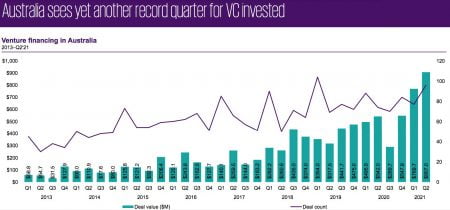Venture capital funding tipped into Australian startups rose to $3.4 billion ($US2.5 billion) in the past financial year, up from $2.6 billion ($US1.95 billion) in the previous year despite the COVID-19 pandemic.
That’s according to the latest KPMG Venture Pulse report, which reported a record 327 Australian venture capital investment deals over the financial year between 1 July 2020 and 1 July 2021, up from 311 over the previous 12 months. The funding information was based on data provided by the financial database Pitchbook.

Amanda Price, head of KPMG High Growth Ventures, said the investment environment for Australian high-growth ventures “had never been stronger”.
“Alongside the continued progression of Australia’s new unicorns — startups that have achieved a valuation of over $1 billion — we have also seen record seed rounds raised,” Ms Price said.
During the year, startups such as insurer Honey, plant-based meat and dairy alternative Nourish Ingredients, and e-commerce company Carted attracted over $10 million of early-stage funding.
“As we look to Australia’s post-pandemic future, the emergence of these digital disruptors has massive potential to contribute to the nation’s economy,” Ms Price said.
Industry and Technology Minister Christian Porter told InnovationAus the figures were encouraging and said show confidence in the venture capital sector to invest in Australian businesses.
“Startups bring new products and services to market, increasing productivity and economic growth and creating new jobs,” he said. “The government is focused on having the right environment for Australian startups to flourish through access to finance, new markets, talent and support.
“There’s always more to do, but these figures suggest our investments and focus [are] paying dividends.”
Benjamin Chong, partner at Australian venture capital firm Right Click Capital, said the increase in investments over the past year validated decisions taken by the federal government five years ago to support innovative new companies. But he said there was a “risk that the early good work will be undone”.
“Governments at all levels need to commit to a long-term program of research and development and other incentives so we can keep and attract talented individuals,” Mr Chong said.
“Our higher education system needs to be bolstered and we should be opening our country to more skilled migrants who can fuel this growth. The current blocking of the borders is making it difficult to build a competitive Australia.”
Niki Scevak, partner at venture capital firm Blackbird, said local startups were receiving record-breaking funding “because Australian startups are creating record-breaking amounts of progress”.
“Our ecosystem has already produced three generational companies in Atlassian, Canva and Afterpay with the prospects for many more in the coming decades,” Mr Scevak said.
Despite this, Mr Scevak used the release of KPMG’s report to point out a lack of proper data on early-stage startup funding.
The lack of quality data to track startup progress was a point recently noted in a speech by Andrew Liveris, chairman and chief executive officer of chemical company Dow Chemical.
“It is unlikely that we will produce enough companies to increase our chances of launching companies onto [the list of the world’s 20 largest companies by market capitalisation] if we do not change the trend reported by the Startup Muster Report of 2018, which featured analysis by CSIRO’s Data61,” Liveris said.
“The report shows growth in startups in Australia until 2017 followed by a sharp decline of 12 per cent to 2018. I cannot tell what’s happened since then, because after five years of data gathering, the research is no longer funded.”
Mr Scevak said seed rounds used to be announced to the press when there were more media outlets eager to cover even the smallest of financings.
“That no longer is the case, so most rounds go unannounced and so most services that catalogue startup financings become inaccurate,” he said, pointing to the Cut Through Venture monthly newsletter, run as a personal project by corporate startup program manager Chris Gillings, as one of the few recent attempts to keep abreast of Australian and New Zealand venture funding.
James Alexander of Sydney-based startup accelerator Galileo Ventures, which invests $200,000 in early-stage companies, agreed that funding reports often didn’t paint the full picture.
“Industry-wise, we’re super cautious on data from any local or international reports, especially from services like Pitchbook, because it typically under-reports the activity,” Mr Alexander said.
“PitchBook doesn’t even have most of our 10 investments; I think it’s got one of the 10 investments we’ve done this year.”
He said Australia was seeing record funding “because there’s a record amount of very valuable businesses”.
“As long as that keeps happening, we’ll see more capital come in,” Mr Alexander said.
In recent years, Mr Alexander said he’d noticed some traditional funds had moved to later-stage investments, leaving a small gap in the market for seed investors like Galileo.
“The bigger funds, as they’ve gotten bigger, are typically signing fewer tiny, tiny cheques just by nature of the fact that they’re much bigger now and they have to deploy more capital,” he said.
Labor’s industry and innovation spokesman Ed Husic said that when you looked at what’s providing a boost to the pool of funds available for local talent, it was in large part superannuation.
“It stands in contrast to any measure or financial assistance brought forward by the Coalition,” Mr Husic said.
“It’s paradoxical that the Coalition is spending a hell of a lot of time undermining Australia’s super system while neglecting to correct shortcomings in their own supports for early-stage innovation.”
Any upward trend in venture capital investment was positive news, Mr Husic said.
“But we need government to have the same confidence,” he said.
“We have a Prime Minister who consistently maintains that we should be the best adopters of offshore technology and innovations, rather than creators, and supporters of our own.”
Industry and Technology Minister Porter said specific tax incentives and targeted co-investment funds were important, including flow-through taxation vehicles for venture capital investment such as the Early Stage Venture Capital Limited Partnerships (ESVCLP) and Venture Capital Limited Partnerships (VCLP). A total of $440m was invested by ESVCLPs and $1.1b by VCLPs in 2020-21, according to Mr Porter.
“Tax incentives for early-stage investors has seen over $1 billion invested in early-stage companies across four years and the Biomedical Translation Fund and the CSIRO Innovation Fund (Main Sequence Ventures) also help startups,” Mr Porter said.
The minister also pointed to a range of other specific programs such as the Entrepreneur’s Programme, Co-operative research centres, the Business Research and Innovation initiative, Boosting Female Founders, the Landing Pads program, enhancements to the research and development tax incentive, and programs delivered by CSIRO such as the Kick-Start program.
Five of the top Australian venture capital investments in financial year 2020/21
| Company | Deal size ($US) | Industry | State |
| Airwallex |
$100m |
Financial Software | VIC |
| Brighte |
$100m |
Specialised Finance | NSW |
| Athena |
$90m |
Consumer Finance | NSW |
| SafetyCulture | $73m | Business/Productivity Software | QLD |
| Canva | $71m | Multimedia and Design Software | NSW |
Five of the top Australian seed round startup investments in financial year 2020/21
| Company | Deal size ($US) | Industry | State |
| Honey | $12m | Property and Casualty Insurance | NSW |
| Nourish Ingredients | $11m | Food Products | NSW |
| Carted | $10m | Social/Platform Software | QLD |
| Pyn | $8m | Communication Software | NSW |
| Vitruvian | $6m | Recreational Goods | WA |
Do you know more? Contact James Riley via Email.


Missing one of the largest raises in in Australia – $US172.5 million ($221 million) capital raise by Octopus Deploy in April 2021.